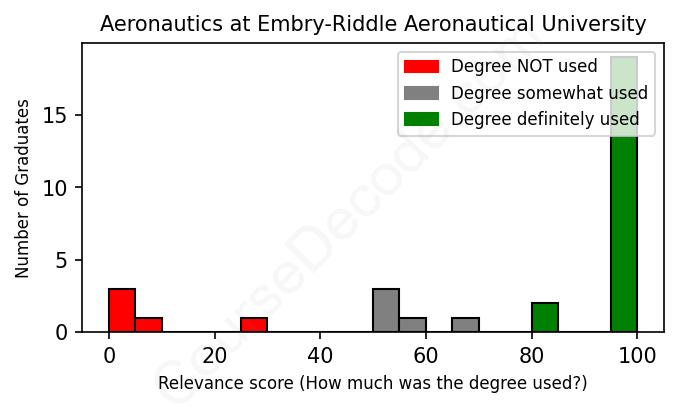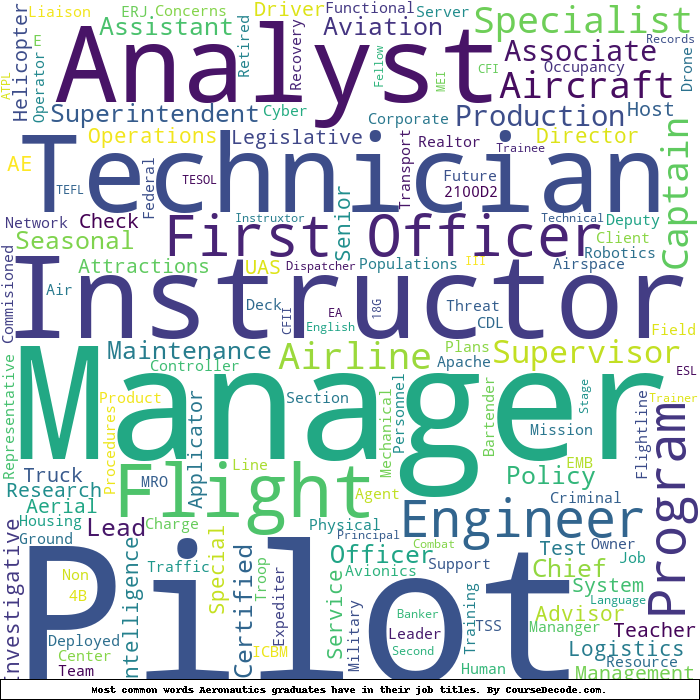
First, some facts. Of the Aeronautics graduates from Embry-Riddle Aeronautical University we've analyzed , here's how many have used (or NOT used) their degree in their career:

These are estimates based on AI analysis of 31 LinkedIn profiles (see below).
The verdict? Above average. Overall, with an average relevance score of 76%, Aeronautics graduates from Embry-Riddle Aeronautical University have a higher likelihood (+9%) of finding work in this field compared to the average graduate across all fields:
And for comparison, here's the chart for all profiles we've looked at across all degrees.
Also, after graduating, only 29% of these graduates have pursued further education other than another Bachelor's degree (such as a Masters degree or other), compared to the average across all profiles of 35%. This suggests a Bachelors degree is enough for most Aeronautics graduates, and it's normal to look for work straight after graduation.
See the details:
|
Relevance score: 8% We think this person has NOT gone into a career related to their degree. We think this person has NOT gone into a career related to their degree.
DEGREE INFOGraduated in 2020 from Embry-Riddle Aeronautical University with a Bachelor of Science - BS in Aeronautics. No other secondary education since. JOB HISTORY SINCE GRADUATIONATPL Trainee ATP Flight School Jan 2021 - May 2021 Attractions Host  Walt Disney World May 2021 - Mar 2022 Attractions Trainer  Walt Disney World Dec 2021 - Mar 2022 Stage Technician  Walt Disney World Mar 2022 - Present ABOUTFull-time Five Keys analyst and executor. Prone to outbursts of creativity and occasional insane humour. |
The top 10 most common jobs done by the graduates we've analyzed (ranked most common to least) are:
When you look at the job outcomes for graduates from Embry-Riddle Aeronautical University, it’s pretty clear that there’s a significant lean towards aviation and aerospace-related positions. Many alumni have taken on roles like pilots, program managers, and technical specialists, which all directly relate to their aeronautics education. Jobs like Mission Engineer at NAVAIR or Assistant Program Manager at the Navy Department definitely show a strong connection to the skills and knowledge learned in their degrees. It's notable that positions in the U.S. Air Force and similar organizations, such as aircraft maintenance technicians or production supervisors, also appear frequently, confirming that many are applying their education in practical, relevant ways within the aeronautics industry.
However, not every career path taken by these graduates stays true to the field of aeronautics. There are several instances where alumni have ventured into roles that are either loosely connected or completely unrelated to their studies, like teaching ESL or working in real estate. Although these jobs might leverage some transferable skills, they clearly don’t utilize the specialized knowledge from their aeronautics degrees. Overall, while a decent number of graduates have aligned their careers closely with aeronautics, there’s a noticeable mix that takes them into different directions, reflecting a diverse range of interests and opportunities beyond their degree specialty.
Here is a visual representation of the most common words in job titles for Aeronautics graduates (this is across all Aeronautics graduates we've analyzed, not just those who went to Embry-Riddle Aeronautical University):

When looking at the career paths of graduates from Embry-Riddle Aeronautical University, especially those who finished in recent years, it seems like a solid chunk of them stick to fields closely related to aeronautics and aviation. Right after graduating, many tend to find their first roles in aviation-specific positions, whether that's as pilots, flight instructors, or in various engineering and operational roles. For instance, recent graduates are frequently entering the airline industry, moving on to positions like airline pilots or flight instructors quite quickly after graduation.
Fast forward five to ten years, and you'll notice a similar trend. A lot of these folks are continuing with impressive careers in aviation and aerospace. Many who start out as pilots or in engineering roles tend to advance to leadership positions within organizations, like program managers or chief pilots. While there are some who venture into unrelated fields—like teaching or banking—it’s clear that a significant number stay in careers that leverage their aeronautics education. Overall, it looks like Embry-Riddle graduates have a good shot at landing solid jobs relevant to their studies right out of college and continuing down those paths in the years that follow.
Getting a Bachelor’s degree in Aeronautics at Embry-Riddle is definitely no walk in the park, but it’s also doable with the right mindset. You’re diving into some serious technical stuff like aerodynamics, propulsion, and systems integration, which can be pretty challenging if you’re not into math or engineering. The coursework can feel intense, especially with the hands-on projects and labs that are a big part of the curriculum. But on the flip side, if you're passionate about aviation and are ready to put in the effort, you’ll find it really rewarding. It's not the easiest degree out there, but if you're committed and curious, you can totally handle it!
Most commonly, in the LinkedIn profiles we've looked at, it takes people 2 years to finish a Bachelor degree in Aeronautics.
Looking at these Embry-Riddle grads, it seems like they've mostly landed some solid gigs in the aeronautics field, which usually pays pretty well. Many of them have climbed the ranks in government and military roles, like senior positions in cybersecurity and program management, which often offer good salaries and benefits. A few are flying for major airlines, which can also mean a comfy paycheck, especially as they gain experience. On the flip side, there are guys who started with roles that might not pay as much early on, like teaching English or working in support technician positions. But overall, a lot of them seem to be on track for decent financial success, especially if they stick with it in an industry known for valuing experience.
Here is a visual representation of the most common words seen in the "about" section of LinkedIn profiles who have a Bachelor degree in Aeronautics (this is across all Aeronautics graduates we've analyzed, not just those who went to Embry-Riddle Aeronautical University). This may or may not be useful:

Here are all colleges offering a Bachelor degree in Aeronautics (ordered by the average relevance score of their Aeronautics graduates, best to worst) where we have analyzed at least 10 of their graduates:
| College | Score | Count |
|---|---|---|
 Embry-Riddle Aeronautical University Embry-Riddle Aeronautical University
|
76 | 31 |